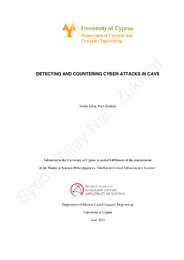| dc.contributor.advisor | Michael, Maria | en |
| dc.contributor.advisor | Laoudias, Christos | en |
| dc.contributor.author | Zukhraf, Syeda Zillay Nain | en |
| dc.coverage.spatial | Cyprus | en |
| dc.creator | Zukhraf, Syeda Zillay Nain | en |
| dc.date.accessioned | 2023-08-07T07:15:52Z | |
| dc.date.available | 2023-08-07T07:15:52Z | |
| dc.date.issued | 2023-06 | |
| dc.identifier.uri | http://gnosis.library.ucy.ac.cy/handle/7/65651 | en |
| dc.description.abstract | Connected and Autonomous Vehicles (CAVs) are becoming increasingly popular due to their ability to make driving safer and more efficient. However, these vehicles rely heavily on GPS systems to determine their location and route. Unfortunately, GPS systems are vulnerable to spoofing attacks, where malicious actors can provide false location information to the CAV, potentially causing accidents or other dangerous situations.
In the literature foreseen, there is a limitation for the detection and mitigation technique for GPS spoofing. To address this problem, we have developed a solution by using in-vehicle detection. The vehicle takes information from the sensors of the car like Inertial Measurement Unit (IMU), Global Navigation Satellite System (GNSS), and Odometer, and detects any anomalies that may indicate a spoofing attack. This approach is practical and effective, as it does not require information from neighboring vehicles, which can be unreliable in certain situations.
Another analysis as a part of this thesis is by utilizing Machine Learning (ML) algorithms. The traditional attack detection solutions developed by using ML techniques require normal and attack data labels. Obtaining 'normal' and 'attack' data labels in practical or controlled settings is challenging for conventional attack detection methods. To address this limitation, we are utilizing the ML algorithm only to process attack-free scenarios for the training stage. Different ML techniques are used that support the detection of anomalies. This proposed approach is effective as it does not require labeled data and can adapt to new and evolving attack strategies.
The suggested solution builds on a previous research project at KIOS, called the " CARAMEL-In-vehicle Detection Solution ". By combining In-vehicle Detection Solution and machine learning-based techniques, this solution can effectively detect GPS spoofing attacks in CAVs. | en |
| dc.language.iso | eng | en |
| dc.publisher | Πανεπιστήμιο Κύπρου, Πολυτεχνική Σχολή / University of Cyprus, Faculty of Engineering | |
| dc.rights | CC0 1.0 Universal | * |
| dc.rights | info:eu-repo/semantics/openAccess | en |
| dc.rights | Open Access | en |
| dc.rights.uri | http://creativecommons.org/publicdomain/zero/1.0/ | * |
| dc.title | Detecting and countering Cyber-Attacks in CAVs | en |
| dc.type | info:eu-repo/semantics/masterThesis | en |
| dc.contributor.committeemember | Theocharides, Theocharis | en |
| dc.contributor.committeemember | Ellinas, George | en |
| dc.contributor.department | Τμήμα Ηλεκτρολόγων Μηχανικών και Μηχανικών Υπολογιστών / Department of Electrical and Computer Engineering | |
| dc.subject.uncontrolledterm | LOCATION SPOOFING | en |
| dc.subject.uncontrolledterm | ATTACK DETECTION | en |
| dc.subject.uncontrolledterm | MACHINE LEARNING | en |
| dc.subject.uncontrolledterm | AUTONOMOUS VEHICLES | en |
| dc.subject.uncontrolledterm | CYBERSECURITY | en |
| dc.author.faculty | Πολυτεχνική Σχολή / Faculty of Engineering | |
| dc.author.department | Τμήμα Ηλεκτρολόγων Μηχανικών και Μηχανικών Υπολογιστών / Department of Electrical and Computer Engineering | |
| dc.type.uhtype | Master Thesis | en |
| dc.contributor.orcid | Zukhraf, Syeda Zillay Nain [0000-0002-3832-1470] | |
| dc.contributor.orcid | Laoudias, Christos [0000-0002-2907-7488] | |
| dc.gnosis.orcid | 0000-0002-3832-1470 | |
| dc.gnosis.orcid | 0000-0002-2907-7488 | |


